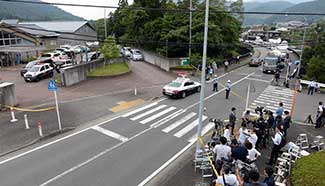
TIANMEN, July 25, 2016 (Xinhua) -- Soldiers evacuate trapped people in Huangtan Township in Tianmen, central China's Hubei Province, July 25, 2016. (Xinhua/Xiong Qi)
BEIJING, July 26 (Xinhua) -- Severe flooding across the country has left hundreds dead or missing since the rainy season began in early June, and the disaster response effort has exposed some challenges.
China has mobilized soldiers, officials and members of the public to save lives and protect property.
Heavy rain across north and northeast China last week left 164 people dead and 125 missing, according to the Ministry of Civil Affairs (MCA).
The central government on Monday allocated 250 million yuan (37.4 million U.S. dollars) to disaster relief efforts in Hebei, one of the worse-hit provinces.
The money will cover emergency relocation, temporary housing, reconstruction of damaged houses and bereavement settlement, according to the MCA.
The middle and lower reaches of China's longest river, the Yangtze, and some major fresh-water lakes have swollen and caused severe flooding in the southern part of the country.
Even in central Beijing, the situation is no better. Last week, the capital experienced its heaviest rainfall in years, causing rail, road and air traffic disruptions. The meteorological authority issued an orange storm alert, the second-highest of China's four-tier warning system.
"The heavy rain [this year] is closely connected to El Nino, which appeared to be the strongest since 1951," said Zhou Bing, chief observer of the National Climate Center.
President Xi Jinping has ordered all-out efforts to control and fight floods, stressing that people's safety should be the top priority.
Xi, speaking at a symposium last week, said that Communist Party of China (CPC) committees and governments at various levels should strengthen leadership over flood control and relief work.
He said everything must be done to guarantee public safety, including the relocation of those in areas of risk, particularly the elderly who live alone and "left behind" children of migrant workers.
ALL HANDS ON DECK
The central and local governments have rolled out a variety of measures to save people's lives.
So far, over 59,000 troops of the armed police force have joined the flood rescue work, helping to relocate more than 88,000 people.
Wang Qilong of the Chinese Armed Police Force (CAPF) said on Sunday that 16 CAPF corps, seven divisions and other troops had been mobilized.
CAPF troops have worked on over 375 km of dikes, repaired almost 1,000 km of road and dredged over 80 km of river bed.
Wu Aoxiang, a soldier in east China's Jiangxi Province, has been braving the elements to fix embankments.
Jiangxi, one of the 11 provinces, autonomous regions and municipality that the Yangtze flows through, has seen 15 percent more rain than average years. The deluge has caused the water levels of the river to rise.
"When the sky clears, the sun comes out and we are at risk of sunburn," said Wu, 23.
His arms are red and peeling, and his waterlogged feet are sore and blistered.
"Our first priority is to save people's lives," he said.
Soldiers are not the only ones on the front line.
In Jiangxi's Pengze County, party official and elementary school teacher Yang Kai has spent the past few weeks patrolling an embankment, inspecting it for seepage. Many of the houses in his village have been inundated by water from Poyang Lake, China's biggest fresh water lake.
"If we find any signs of seepage, we leave a marker at the spot and then soldiers will come and fix it," he said.
It is no easy job. Working in groups of three, officials like Yang have to patrol the 2-km embankment for several hours a day.
Facing a lack of manpower, some localities have even appealed to their migrant workers to come home to help fight floods.
Zhang Suorong is one of them.
He is from Jiangxinzhou, Jiangxi Province, but lives and works 500 kilometers away in Yangzhou, Jiangsu Province. Jiangxinzhou, an island in the Yangtze River in Jiujiang County, has a registered population of about 50,000 people. However, like Zhang, many have left for jobs in big cities.
The town has called its migrant workers home, with the local government utilizing social media to disseminate its plea for help.
"Dear town fellows, we are facing a critical period as floods devastate our home," it said. "We need our 50,000 residents to work together to battle this natural disaster."
Days after the notice was issued, more than 3,000 migrant workers returned, said local Party official Zhu Wenbin.
"I just had to come back," Zhang said. "It is our home. If we do not return to protect it, who will?"
MORE EFFORTS NEEDED
While China is moving heaven and earth to protect and clean up its inundated cities and counties, problems have also surfaced out of water.
On Monday, a fifth government official in north China's Hebei Province was suspended for dereliction of duty in relation to his handling of the fatal floods.
Public outrage mounted, with many questioning why they were not informed of the impending floods, and sparks flew over why the province's leading officials had failed to evacuate its citizens before the flood crested.
Dong Xiaoyu, mayor of Xingtai City, which was worst hit by the floods, apologized for his government's inadequate response after storms left 34 dead and 13 missing in the city.
"Part of the tragedy is Xingtai experienced heavy rain within a very short time," said Xia Xueluan, a professor with Peking University. "But it also raised questions about the responsibilities of those holding public posts."
"It is essential that the public know that officials are doing their jobs," Xia added. "For example, have government funds been properly allocated in river dredging? Have officials been to the flood sites and made proper preparations?"
Xia said that the Xingtai incident indicates a lack of preparation.
"We need to learn from the Xingtai disaster to win the fight against flooding," he said.











